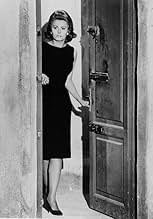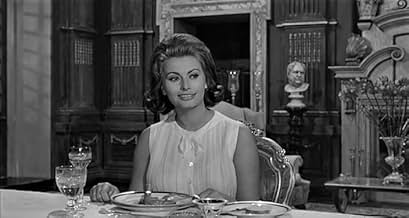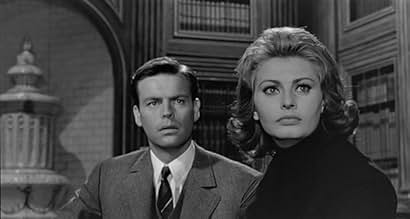Ajouter une intrigue dans votre langueAn insane German war criminal lives in a secluded house owned by his rich father who lets him think the war is still on, some 15 years after the fact.An insane German war criminal lives in a secluded house owned by his rich father who lets him think the war is still on, some 15 years after the fact.An insane German war criminal lives in a secluded house owned by his rich father who lets him think the war is still on, some 15 years after the fact.
- Director
- Writers
- Stars
- Prix
- 2 victoires et 1 nomination au total
Carlo Antonini
- Police Official
- (uncredited)
Antonia Cianci
- Maid
- (uncredited)
Alfredo Franchi
- Groundskeeper
- (uncredited)
Roberto Massa
- Chauffeur
- (uncredited)
Osvaldo Peccioli
- Cook
- (uncredited)
Lucia Pelella
- Groundskeeper's wife
- (uncredited)
Avis en vedette
... from director Vittorio De Sica. German shipping magnate Fredric March learns that he has six months left to live. He summons his son Robert Wagner and daughter-in-law Sophia Loren to his palatial estate in order to set plans for his passing. Loren, who resents Germany's Nazi past and March's role in it, learns that March's older son (Maximilian Schell), believed long dead, has lived in seclusion since the end of the war, so she sets out to learn why he is hidden away. Also with Francoise Prevost and Gabriele Tinti.
This must have been a major European release at the time, as De Sica was one of the most respected directors, and Loren and Schell had just won the lead acting Oscars. It's heavy stuff, with the examination of German culpability for Nazi atrocities a thorny subject. The version I watched was in Italian with subtitles, so it was odd seeing March, Schell and Wagner dubbed with others' voices.
This must have been a major European release at the time, as De Sica was one of the most respected directors, and Loren and Schell had just won the lead acting Oscars. It's heavy stuff, with the examination of German culpability for Nazi atrocities a thorny subject. The version I watched was in Italian with subtitles, so it was odd seeing March, Schell and Wagner dubbed with others' voices.
I saw this movie on the big screen several years ago in San Diego and I've never forgotten it. This movie falls loosely within the Holocaust/antisemitic genre and I'm surprised that many of my fellow Jews have never even heard of it. The idea of a family keeping their ex-Nazi son in the attic (it's not the basement)to protect him from the public is intriguing to say the least. There are a few scenes that I can never forget: Max Schell still wearing his Nazi uniform; his sister wiping up his excrement off the floor, like the family pet; Schell unwrapping and eating chocolate that's wrapped in Nazi tinfoil. To be kept away all these years from communicating with the outside world that's changed so much from the Nazi era. The last scene with Schell and Frederick March standing above the industrial complex that's been created. All these scenes stand out in my mind. The stark black and white film ties in exactly with that dark period in German/Jewish history. I'll never forget this movie. I wish so much that it is someday available in a DVD or (please don't) VHS version--even a copy from a TV movie showing on, say, the Fox movie channel. Anybody have a copy for sale? Contact me.
I always regarded "The Prisoners of Altona" as Sartre's most interesting and perhaps best play, but I did not know that Vittorio de Sica had made a film on it and with Sophia Loren and other great actors, Cesare Zavattini having even somewhat added to the play. The main interest of the play is that it's a Frenchman's assessment of the post-war German situation with acute observations, conclusions and profound considerations. The main character Franz has never left the war behind, while his father, a great industrialist tycoon, has received his own death sentence by a cancer diagnosis and faces the problem and necessity of allowing his life's work a continuity. He has another son (Sophia Loren's husband, Robert Wagner,) who is willing to accept to take over, but his elder brother looms as the bearer of an ominous destiny of the family. Franz (Maximilian Schell) ultimately refuses to accept that Germany is flourishing again, that it is rising to new power and prosperity and clinches to his experience of a defeated nation all in ruins with its people resorting to underground beggary and scavenging, as if the reality of its ruin was of greater comfort to him than any news of its prosperity. Vittorio de Sica made this film two years after "Two Women", and it's in the same vein - relentless realism brought to overwhelming pathos and tragedy. He alternated his serious films with comedies and loved to act himself in comedies, he was more active as an actor and comedian than as a director, but his serious films remain his masterpieces. There is no sweet and lovely Italian music here but the bleak and depressive wailing disharmonies of Shostakovich instead, which actually provide an appropriate mood and accompaniment to this very morose film. It's not one of his best films, but it certainly belongs to his most interesting.
When a movie from 1962 has less than 200 votes on IMDb, what does it mean? Directed by legendary De Sica, and starring great Sophia Loren... it must be a terrible failure? Well, it isn't.
Having read Sartre's play "The Condemned of Altona", it is my impression that the movie is very faithful to its atmosphere. There are some changes, of course: instead of concentrating exclusively on torturing his characters inside the mansion (as Sartre does), De Sica takes advantage of possibilities of film, adding outdoor scenes.
I don't want to reveal the plot, although it is very interesting. I recommend reading the play first, since the relations between characters will be clearer then. Anyway, see this movie if you get the chance!
Having read Sartre's play "The Condemned of Altona", it is my impression that the movie is very faithful to its atmosphere. There are some changes, of course: instead of concentrating exclusively on torturing his characters inside the mansion (as Sartre does), De Sica takes advantage of possibilities of film, adding outdoor scenes.
I don't want to reveal the plot, although it is very interesting. I recommend reading the play first, since the relations between characters will be clearer then. Anyway, see this movie if you get the chance!
This is a darkly disturbing film of a Nazi war criminal, still wearing his German army uniform, who is hidden in his father's house, and led to believe that World War II is still going on. The ending of the movie is a bizarre mix of Fellini and Capote. Schell escapes his "prison" and walks around the streets only to be "shocked" that there is no destruction or war raging. He ends up in a local theater and salutes an actor playing Hitler. I won't give the ending away, but it's a shocking surprise ala Play Dirty or To Live and Die in LA. The acting is great, the black and white film make the movie realistic and it captures a time in history which hopefully is gone for ever. An excellent film.
Le saviez-vous
- AnecdotesSpencer Tracy was offered but declined the role of Albrecht von Gerlach.
- GaffesNazi uniforms were banned after the war, yet Franz walks through the city without being arrested or beaten up. He gets a few strange looks but is otherwise ignored.
- Autres versionsEvery reference to National Socialism was cut from the West German version in 1962.
Meilleurs choix
Connectez-vous pour évaluer et surveiller les recommandations personnalisées
- How long is The Condemned of Altona?Propulsé par Alexa
Détails
- Date de sortie
- Pays d’origine
- Langues
- Aussi connu sous le nom de
- The Condemned of Altona
- Lieux de tournage
- sociétés de production
- Consultez plus de crédits d'entreprise sur IMDbPro
Box-office
- Brut – États-Unis et Canada
- 2 398 000 $ US
- Durée
- 1h 54m(114 min)
- Couleur
- Mixage
- Rapport de forme
- 2.35 : 1
Contribuer à cette page
Suggérer une modification ou ajouter du contenu manquant

























